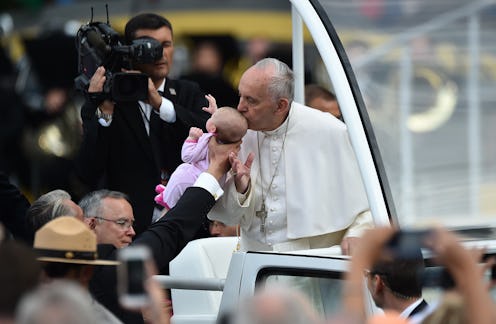News
Pope Francis Learned Some Things About America
Pope Francis' trip to the United States isn't over just yet, but one thing's for sure: it's already been a pretty monumental affair. Huge crowds, throngs of adoring fans and faithful alike, and of course, a little prickly discontent on the part of some conservatives, unhappy with his some of his reformist, politically progressive rhetoric. It hasn't been the longest vacation, but it's definitely given Francis a few insights into how things work over here — here are four things Pope Francis learned about the U.S. during his trip.
On Saturday, Francis spoke to a massive crowd in Philadelphia, Pa., the final city he'll stop in on his stateside swing. He already toured Washington, D.C. and New York City, but he still had a pretty stirring message ready for the final leg of the trip — during mass on Saturday, he called for the Catholic Church to better value women, a statement that people across all strata of American society would be wise to heed.
But there's no doubt that we all taught Francis a few things, too, some good, and some, well, not so good. Here are four such examples — don't worry though, I'm sure we were gracious enough hosts all the same.
1. Americans Are Not Chill
When you're an international megastar like Pope Francis, you can't just expect people to sit back patiently and wait, can you? When Francis was en route to Washington from Cuba, scores of people around the country made this pretty clear — people were tracking the course of his flight while it was in mid-air, which is about as far from cooling your heels as it gets. Popemania, it seems, was thriving enough to make people want to watch a plane slowly moving around on a computerized map. Go figure.
2. There's No Better Place To Be A Rock Star
The treatment Francis has gotten on this trip has been nothing short of the megastar variety — adoration, adulation, and joyfulness have been in large supply. People lining up for a papal parade, dozens deep, people crying in excitement, the whole deal. As if wanting to make the point more literal, in fact, it was announced on Friday that he's releasing a rock album, too.
Simply put, Francis isn't likely to find such a warm reception just anywhere, nor to be treated in quite this kingly fashion anywhere else but the opulent confines of the Vatican. Of course, part of his appeal is his humility, as he doesn't insist upon his high-status the way some former popes have. It comes as little shock that he's been so well-received — America is home to nearly 70 million Catholics.
3. Some People Just Never Learn
One of the foremost political causes Pope Francis has taken up in his relatively short tenure is climate change, and it's an absolutely crucial issue — why would the faithful want to wreck the earth God gave them? That's saying nothing of the countless non-believers who'd like to stay healthy and safe, as well.
It was the focal point of Francis' hotly anticipated encyclical released in June, and he's spoken about it specifically since touching down on American soil. But there are few places more resistant to such talk than here, and that's got to be frustrating for him — the U.S. is a statistical haven for climate change denial, and on Friday, Republican presidential candidate Jeb Bush even played the old "he's not a scientist" card on Francis, who is, in fact, a scientist.
4. Somebody's Always Concern Trolling On Your Behalf
Despite apparently not finding Francis' politics all that endearing, some conservatives have made a bit of noise about perceived slights against the pontiff, primarily by way of the White House's guest list for his visit, which included LGBT Catholics and activists. Of course, Francis himself didn't voice any complaints, and there's nothing in his record of dealing with people that would suggest he'd make an issue out of it.
Quite the contrary, despite holding some predictably retrograde views on LGBT issues, in line with some traditionalist Catholic teachings, he's never publicly professed anything but a desire for more understanding, respect and outreach. But that's the risk of being such a hotly discussed, sought-after public figure in America these days: somebody's always trying to turn you into a political cudgel.
